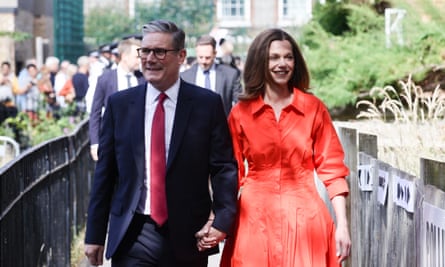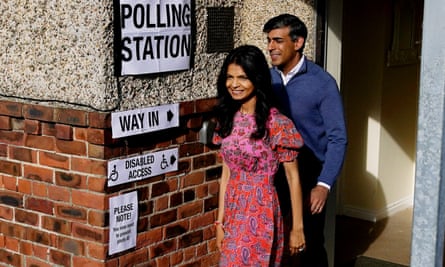Keir Starmer is on course to win a landslide UK election victory, returning Labour to power and bringing a crushing end to 14 years of Conservative rule.
The 10pm exit poll, compiled on behalf of the three main news broadcasters, predicted Labour would win 410 seats, securing a majority of 170 to the Conservatives’ 131.
The Liberal Democrats were expected to take 61 seats, the Reform UK 13, the Scottish National party 10, Plaid Cymru four and the Greens two after Rishi Sunak surprised the country six weeks ago by calling a summer poll.
The results appeared to confirm that Labour’s “time for change” message struck a chord with voters after years of chaos and division under the Tories, including the Brexit vote and its fallout, the handling of the Covid pandemic and the Partygate scandal.
At the last general election, in 2019, the Conservatives had a majority of 80, with 365 seats to Labour’s 203. The SNP won 48 seats and the Lib Dems had just 11.
If the exit poll is correct, Labour has secured a huge swing away from the Conservatives, who will have suffered their worst ever performance, and away from the SNP in Scotland, where John Swinney’s party will have been decimated, losing more than 30 seats.
Reform’s polling at 13 seats appears to suggest the hard-right party has squeezed the Conservative vote across the country, and potentially includes Labour seats. Nigel Farage is the favourite to win the seat of Clacton in Essex on his eighth attempt to enter parliament.
It will pose a major challenge for a Starmer government, which will have to devise a strategy to fight the rise of the hard right, a trend mirrored across Europe. His victory will nonetheless be seen as a beacon of hope for progressive parties across the globe, amid fierce election battles against the populist right in countries including France and the United States.
The Liberal Democrats, who appear on course to increase their seat haul fivefold after Ed Davey’s attention-seeking campaign, are expected to have further dented the Tories by making gains across the south-west and home counties in the “blue wall”.
Starmer is set to be the fourth Labour leader to oust the Conservatives since the second world war, and the first Labour prime minister for 14 years. Rachel Reeves would become the UK’s first female chancellor in a new Labour government.

The exit poll suggests Labour has won back vast swathes of the north of England and Midlands sometimes called the “red wall”, taken by the Tories in 2019, as well as making major inroads against the SNP in Scotland.
Starmer’s victory appeared to have fallen just short of Tony Blair’s historic 1997 win in which Labour won 418 seats and a majority of 179 seats. Starmer, like Blair, has fought the campaign on a platform of promising change after more than a decade of Tory rule.
Labour’s expected win marks a huge turnaround for the party, four and a half years after Starmer took over as leader and less than five since Jeremy Corbyn led the party to a disastrous defeat, its worst result since the 1930s.
The exit poll also indicates the Conservatives have suffered a catastrophic wipeout, with their worst ever performance, losing dozens of seats they won for the first time in 2019 under Boris Johnson. William Hague, the former Tory leader, said it was a “catastrophic result” for the party.
Voters appear to have punished the party for years of scandals under Johnson, the financial crisis caused by Liz Truss, and Sunak’s failure to keep his pledges to turn the country around.
The loss of office follows a weak Conservative campaign by Sunak, marred by a gambling scandal and the prime minister’s early departure from a D-day ceremony, which led cabinet ministers to concede defeat even before polling day.

Starmer thanked those who voted for him, saying: “To everyone who has campaigned for Labour in this election, to everyone who voted for us and put their trust in our changed Labour party – thank you.”
The Labour peer Peter Mandelson told the BBC: “I think that an electoral meteor has now struck planet Earth. In a sense it’s not surprising given everything the country’s gone through over the last 10 years.
“It would have required Superman as leader of the Conservative party to lead them back to some sort of victory and Mr Sunak is not Superman, but I would have to say this: this is an extraordinary achievement for Keir Starmer and his team.
“Nobody in 2019, nobody would have imagined this was possible and they and the team and all the people who’ve won this campaign deserve absolutely every piece of credit that’s coming their way.”
The first seat to declare, shortly after 11pm, was Houghton and Sunderland South, where Labour’s Bridget Phillipson, set to be the education secretary, was re-elected. Reform came second, and the Tories a distant third.
Based on the exit polls, up to 10 of Rishi Sunak’s cabinet appeared to be at serious risk of losing their seats. These include Jeremy Hunt, the chancellor, in Godalming and Ash; Grant Shapps, the defence secretary, in Welwyn Hatfield; David TC Davies, the Welsh secretary, in Monmouthshire; Penny Mordaunt, the leader of the Commons, in Portsmouth North; Alex Chalk, the justice secretary, in Cheltenham.
Others whose seats were believed to be too close to call included the culture secretary, Lucy Frazer, in Ely and East Cambridgeshire; Michelle Donelan, the science secretary, in Melksham and Devizes; Mel Stride, the work and pensions secretary, in Central Devon; Mark Harper, the transport secretary, in Forest of Dean, and Richard Holden, the chair of the party, in Basildon and Billericay.
after newsletter promotion
Sunak appeared likely to hold his seat, as did James Cleverly, the home secretary, Kemi Badenoch, the business secretary, Oliver Dowden, the deputy prime minister, Victoria Atkins, the health secretary, and Claire Coutinho, the energy secretary.
If the exit poll is correct, Sunak is likely to announce his resignation as prime minister on Friday morning before Starmer goes to Buckingham Palace to be officially appointed by King Charles as his successor.
Starmer is expected to give a short speech on the steps of Downing Street before beginning work on his first steps in government. Sources say they expect most, if not all, of the cabinet, to be appointed by the end of Friday, with more junior ministers being confirmed over the weekend and possibly early next week.
The party is holding a rally in London in the early hours of Friday morning – an event that could echo the party’s event to mark Blair’s victory at the Royal Festival Hall shortly after winning the 1997 election.
However, the celebrations are likely to be short-lived, with only a few weeks to begin legislating before parliament goes on summer recess.
The Labour leader said on the campaign trail this week that he would extend the parliamentary term to achieve more before recess, and warned his shadow ministers he expected immediate results.
“I’ve said to the shadow cabinet: ‘I don’t want you having a phone call or a meeting the day after the election that you could have had six months before the election,’” he said on Wednesday.
The new prime minister will then travel to the Nato summit in Washington DC next week – his first chance to position himself as a world leader.
By then, his ministers will already have started to implement their plans for domestic changes. Angela Rayner, the shadow housing and communities secretary, will begin work on a new draft of the national planning policy framework, while Ed Miliband will immediately overturn the de facto ban on onshore windfarms.
Labour then has less than two weeks before presenting its first package of legislation in the king’s speech, including legislation to bolster workers’ rights and to set up Great British Energy, the energy generation company at the heart of Labour’s green plans.
A meeting of the European Political Community will follow immediately afterwards in London – Starmer’s first chance to lobby officially for improved trading relations and to begin work on a new deal over cross-Channel asylum seekers.
Having led a tightly controlled campaign with little in the way of spontaneous interaction with the public or new policy ideas, Starmer is under pressure to spell out in greater detail how he intends to begin tackling problems ranging from Britain’s prisons crisis to record NHS waiting lists.
Reeves is likely to present her first budget in the autumn, where she is expected to announce Labour’s first tax policies, including tightening non-dom tax breaks, extending the oil and gas windfall tax and taxing private school fees.
Reeves has also drawn up plans for increases to capital gains tax and inheritance tax, as Labour aims to avoid the swingeing public sector cuts that are implied by the current fiscal forecasts.
In a sign that Starmer was already mentally preparing for the shift to power, he told reporters on Wednesday: “I’m really pleased that four and a half years of work is being vindicated, because this has not been an easy gig.”
More from the Guardian
-
Opinion: ‘This exit poll portends total rejection of these amoral Tories – and incredible vindication for Labour’
-
Analysis: Labour hardly dared to believe. But it seems the polls weren’t lying
Source: theguardian.com


















